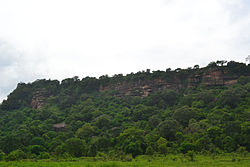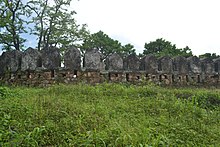Vijaygarh Fort
| Vijaygarh Fort विजयगढ़ किला Vijaygarh | |
|---|---|
 Vijay Garh Fort on the Hill | |
| Location | Sonbhadra |
| Coordinates | 24°34′40″N 83°10′51″E / 24.577708°N 83.180845°E |
Vijaygarh Fort (Hindi :विजयगढ़ किला) is a ruined fort located 30 km from Robertsganj in south east direc in Mau Kalan village on Robertsganj-Churk road, in the Sonbhadra district, Uttar Pradesh India.
History
Vijaygarh Fort was built by the unknown king and was renovated by Maharaja Vijay Pal in 1040. Vijay Pal was Ahir King. Last ruler of Vijargarh Fort was Raja Chait Singh of Benares. He ruled until British reached this point. The fort is considered to be mesmeric and another fort is said to be hidden under it. Near the main gateway of the fort there is a tomb, which is said to be that of Saiyyed Jain-ul-Abdin Meer Sahib popularly known as Hazrat Meeran Shah Baba. There are two tanks known as Mira Sagar and Ram Sagar near the tomb which are never dry.
Attractions
Vijaygarh Fort contains several old temples and red stone pillars bearing inscriptions of Vishnuverdhan feudatory of Samudragupta. The fort is famous for its rock inscriptions, cave paintings, many statues and its perennial ponds. There are four ponds inside the premises of the fort which never dry. More than half the area of Vijargarh is covered by the steep and rugged hills of the Kaimur Range. Between the two tanks there was a palace known as Rang Mahal (Hindi:रंग महल) which had artistic rock carvings and assumed as palace of Princess Chandrakanta.
There is a fair (Urs) organized every April, and people from different religions and sects attend.
Vijaygarh fort has both historical and archaeological importance. The fort and Princess Chandrakanta were pertinently described in the novel Chandrakanta by Devaki Nandan Khatri
In the Hindu month of Shravana, Kānvarias (Kanwar Yatra) collect water from Ram Sagar and then start their holy journey to the Shivdwar.
Gallery
-
Ganesha statue at Vijay Garh Fort
-
Entrance at a ruined building at Vijay Garh Fort
-
Entrance of Vijay Garh Fort
-
Lake 1 on Vijay Garh Fort
-
Lake 2 on Vijay Garh Fort
-
View from the top of Vijay Garh Fort
-
Ruined Building at Vijayagarh Fort
-
Shivalingam and Goddess Parvati's Statue at fort
-
Walls of Vijaygarh Fort
-
Broken rooms at Fort
-
Ruined building complex
-
Pillars of ruined building at Vijaygarh Fort
-
Wall of Fort and Dhanraul Dam in background
References
- http:sonbhadra.nic.in/PrincesChandrakanta.aspx
- Chandrakanta by Devaki Nandan Khatri
As of this edit, this article uses content from "Vijayghar(chandrakanta Kila Nerjaguleri's Serial)", which is licensed in a way that permits reuse under the Creative Commons Attribution-ShareAlike 3.0 Unported License, but not under the GFDL. All relevant terms must be followed.













